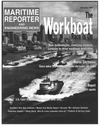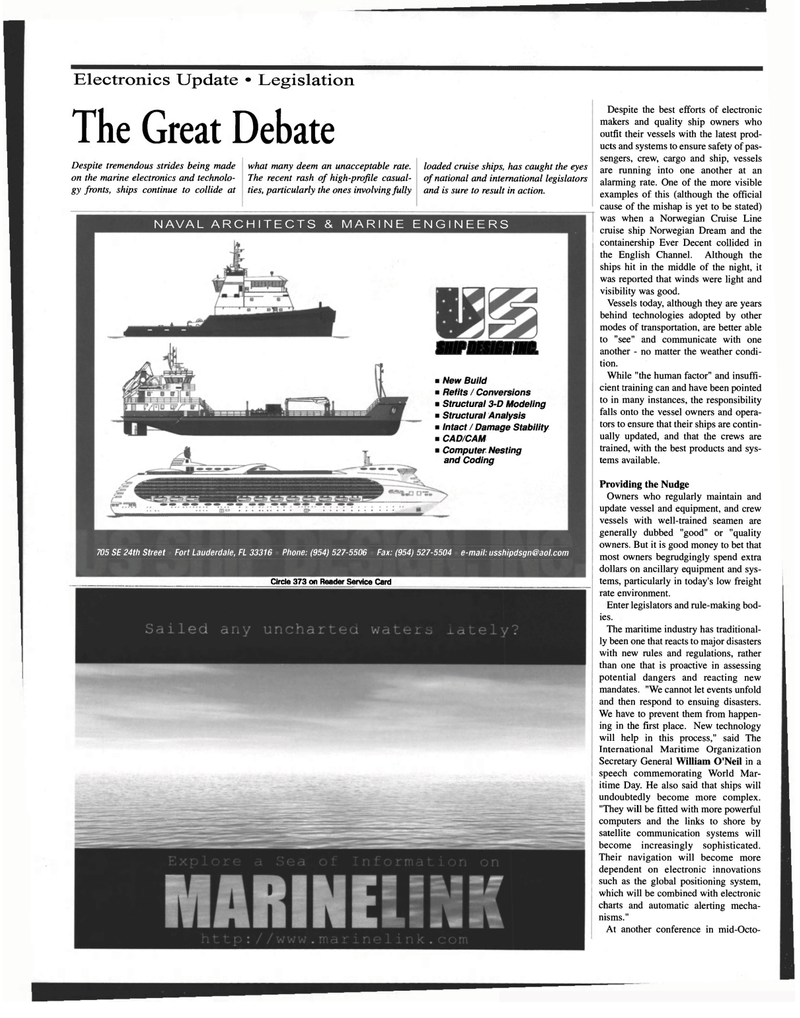
Page 68: of Maritime Reporter Magazine (November 1999)
Read this page in Pdf, Flash or Html5 edition of November 1999 Maritime Reporter Magazine
Electronics Update ? Legislation The Great Debate Despite tremendous strides being made on the marine electronics and technolo-gy fronts, ships continue to collide at what many deem an unacceptable rate. The recent rash of high-profile casual-ties, particularly the ones involving fully loaded cruise ships, has caught the eyes of national and international legislators and is sure to result in action. Despite the best efforts of electronic makers and quality ship owners who outfit their vessels with the latest prod-ucts and systems to ensure safety of pas-sengers, crew, cargo and ship, vessels are running into one another at an alarming rate. One of the more visible examples of this (although the official cause of the mishap is yet to be stated) was when a Norwegian Cruise Line cruise ship Norwegian Dream and the containership Ever Decent collided in the English Channel. Although the ships hit in the middle of the night, it was reported that winds were light and visibility was good. Vessels today, although they are years behind technologies adopted by other modes of transportation, are better able to "see" and communicate with one another - no matter the weather condi-tion. While "the human factor" and insuffi-cient training can and have been pointed to in many instances, the responsibility falls onto the vessel owners and opera-tors to ensure that their ships are contin-ually updated, and that the crews are trained, with the best products and sys-tems available. Providing the Nudge Owners who regularly maintain and update vessel and equipment, and crew vessels with well-trained seamen are generally dubbed "good" or "quality owners. But it is good money to bet that most owners begrudgingly spend extra dollars on ancillary equipment and sys-tems, particularly in today's low freight rate environment. Enter legislators and rule-making bod-ies. The maritime industry has traditional-ly been one that reacts to major disasters with new rules and regulations, rather than one that is proactive in assessing potential dangers and reacting new mandates. "We cannot let events unfold and then respond to ensuing disasters. We have to prevent them from happen-ing in the first place. New technology will help in this process," said The International Maritime Organization Secretary General William O'Neil in a speech commemorating World Mar-itime Day. He also said that ships will undoubtedly become more complex. "They will be fitted with more powerful computers and the links to shore by satellite communication systems will become increasingly sophisticated. Their navigation will become more dependent on electronic innovations such as the global positioning system, which will be combined with electronic charts and automatic alerting mecha-nisms." At another conference in mid-Octo-NAVAL ARCHITECTS & MARINE ENGINEERS SHIP DESI6N INC. ? New Build ? Refits / Conversions m Structural 3-D Modeling ? Structural Analysis ? Intact / Damage Stability ? CAD/CAM m Computer Nesting and Coding 705 SE 24th Street Fort Lauderdale, FL 33316 Phone: (954) 527-5506 Fax: (954) 527-5504 e-mail: [email protected] Circle 373 on Reader Service Card

 67
67

 69
69
